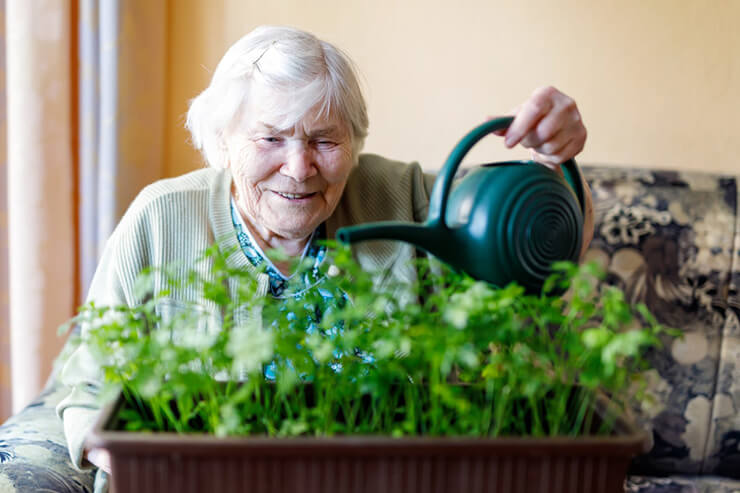
There are plenty of activities you can do to strengthen your bond with your aging loved ones. While traditional activities like baking or watching television together are fun, indoor gardening is a unique and meaningful way to spend time together. Beyond bringing joy and beauty into your home, this activity can have incredible health benefits. Here’s how gardening can help older adults.
Create Special Moments Together
Indoor gardening can become a shared project that you and your loved one look forward to. Whether it’s repotting plants, growing herbs or starting a windowsill garden, these activities encourage bonding and teamwork. Gardening creates a sense of purpose and accomplishment for older adults, allowing them to feel valued while creating something beautiful. As you spend time together, you may find that gardening opens up opportunities for meaningful conversations.
See the Health Benefits of Gardening for Older Adults
Gardening might be a fun and rewarding hobby, but it’s also a powerful way to improve health and well-being. For many people, it offers several health benefits beyond the simple enjoyment of watching plants grow. Here are some of the key advantages:
Improved Mobility and Strength
While gardening is a fun and rewarding hobby, it’s also a fantastic way to keep older adults active and engaged. Regular gardening can improve physical strength, flexibility and even balance, potentially reducing the risk of falls. For your loved one, simple tasks like watering plants or pruning can become gentle exercises that keep their joints and muscles moving.
Better Heart Health
Gardening may not seem like a workout, but it’s an excellent way to get the heart pumping. Movements like bending, reaching and lifting small pots can increase heart rate, improving blood circulation and overall cardiovascular health. These light exercises can be an enjoyable way to stay active without making your older loved one feel like they’re working out.
Boosted Vitamin D Levels
Although indoor gardening doesn’t always involve direct sunlight, setting up a garden near a sunny window allows those inside to soak up some natural light. Vitamin D is crucial for bone health. Even small doses of sunlight can help strengthen bones and reduce the risk of osteoporosis.
Stress Reduction
One of the most significant health benefits of gardening for older adults is its ability to reduce stress. Spending time with plants can lower cortisol levels, the hormone associated with stress. The repetitive, soothing emotions, combined with the calming presence of greenery, create a therapeutic environment that helps many people feel more relaxed and peaceful.
Improved Mental Health
Gardening is a natural mood booster. For older adults who may experience loneliness or depression, nurturing plants provides a sense of purpose and accomplishment. Watching plants grow under their care can be incredibly rewarding, increasing self-esteem and happiness. Additionally, gardening can reduce symptoms of anxiety and depression, making it a wonderful activity for mental well-being.
Better Memory and Cognitive Function
Gardening engages multiple senses — touch, sight, smell and even taste when growing herbs and vegetables. This sensory stimulation can enhance cognitive function and improve memory recall, especially for individuals with early signs of dementia. It’s an excellent way to keep the mind active while enjoying a calming hobby.
How Does Gardening Help Older Adults Stay Connected?
Isolation and loneliness can be common struggles as we age, especially during colder months or busy seasons when everyone seems to be socializing. Indoor gardening creates opportunities for connection. The responsibility of caring for plants gives older adults a routine, which can be incredibly grounding and uplifting. Incorporating technology, like apps that track plant care, can also make this activity more interactive and engaging for tech-savvy gardeners.
Gardening as a New Tradition
If your aging loved ones aren’t able to do things they once were, such as long walks or cooking meals, gardening can be a wonderful alternative. Setting up an indoor garden together, selecting pots, planting seeds and decorating pots can become cherished new traditions that bring everyone together. While it may be disheartening to change these traditions, bonding and spending quality time together is what’s most important.
Easy Indoor Gardening Projects
If you’re new to indoor gardening or want simple ideas to try, consider these beginner-friendly activities:
- Mini herb garden: The simplest herbs to grow include basil, parsley, rosemary or mint and they’re perfect for tasty recipes.
- Festive succulent planters: Decorate pots and fill them with easy-to-maintain succulents like aloe vera or cacti.
- Terrarium building: Create a miniature indoor landscape using glass containers, pebbles and small plants.
- Seed starting kits: Introduce them to growing plants from scratch with seed kits designed for indoor use.
Why Indoor Gardening Is Perfect for Family Bonding
Spending time alone can be challenging for older adults, especially those who may feel lonely or less involved in family events. Indoor gardening creates a sense of purpose and brings vibrant life into the home, transforming their darker days into a season of growth and connection. The physical, mental and emotional health benefits of gardening for older adults make life even brighter. ❖



